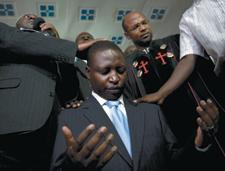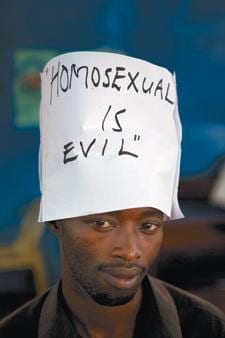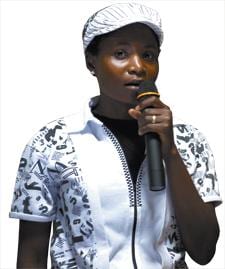
Ugandan MP David Bahati introduced a private member's bill, more infamously known as the 'Kill the gays' legislation, that would create the offence of "aggravated homosexuality." Conviction could lead to the death penalty for repeat offenders. Credit: Benedicte Desrus photo

Credit: Benedicte Desrus photo
Xtra: What has life been like for you as an out lesbian in Uganda?
Val Kalende: You lose your life the day you decide to come out. Unlike some of my former classmates I graduated with at Makerere University, I do not know what it means to have a job and keep it. I don’t know what it means to rent a house and keep it for more than five months. Now I understand why some gay people hate themselves for being who they are. They simply cannot take it. I have been so lucky not to be one of those who keep silent about things that hurt me.
Xtra: You’ve been described as one of Uganda’s most outspoken and prominent human rights activists. What prompted you to take such a public leadership role in the fight for queer rights?
VK: I started being an activist the day I realized no one could make me free but myself. It’s like building a house but knowing you may never live in it. The reason I am not losing patience is that I truly know that if I don’t live to see it, someone else will, and that is what keeps me fighting.
Xtra: You’re also a journalist. Why is it so important to cover the anti-gay movement in your country?
VK: The majority of Ugandans are unnecessarily homophobic, not because they want to be, but because they are victims of ignorance. When I told my life story in one of Uganda’s local daily newspapers last year, a lot of people criticized me for exposing myself. I believe that telling our stories is perhaps the biggest weapon we have against our adversaries. I believe the more people see us standing tall to reclaim our spaces in society, the easier it will be for them to understand that we did not fall down to earth from another planet. We are human beings who deserve respect.
Xtra: Even if it puts you personally at risk?
VK: Freedom comes because there are people who are willing to take risks in order to achieve it. Such people are never the majority but a few strong-willed characters that will do anything to make change happen. I did not become an activist expecting that things will be easy. I anticipated the denial and humiliation I would get from my family and friends. But what is easier? To be silent and remain oppressed, or to speak out, take risks and win in the end?
A certain anti-gay pastor came to [my newspaper’s] offices to talk to our editors about my lesbianism. He asked them to fire me and get rid of an American intern who had also been exposed as a lesbian because “we were a bad influence on our readers.” We had co-authored a story about homosexuality in Uganda and interviewed a few gay activists. Things were never the same after that. The anti-gay pastor held a massive demonstration in Kampala calling for the deportation of the American intern. A few days after that, my editor suspended me from the newsroom for three weeks over a trivial matter. My colleagues had already started alleging that I was having an affair with a famous female musician in Uganda and other female writers at the company. I guess they found me an easy target for mockery. I felt very uncomfortable. I chose not to go back even after I had served my suspension.
Now that I will not be in Uganda for some time, maybe my life will become less threatened. I am pursuing my master’s in the US.
Xtra: What led the government to introduce the 2009 anti-homosexuality bill?
VK: The anti-homosexuality bill is a private member’s bill sponsored and introduced by David Bahati, a member of Parliament. However, the government of Uganda has always been opposed to homosexuality. In 2008, government arrested me and two of my colleagues for attending an HIV/AIDS conference in Kampala. Many similar arrests have taken place and homophobic incidents are on the rise since the introduction of the bill. Most Ugandans are opposed to homosexuality and would want to see this bill become law. But a few US-based religious conservative groups are also responsible for this bill and are sponsoring the anti-gay agenda in Uganda.
Xtra: What are the major clauses of the proposed anti-homosexuality bill?
VK: Out of the 18 clauses that make up this bill, only six introduce new legal provisions. The other 12 simply repeat what already exists on the law books. The bill defines the term “homosexuality” in such a broad fashion as to include “touching another person with the intention of committing the act of homosexuality.” The bill criminalizes “Promotion of Homosexuality” and introduces the “Failure to Disclose the Offence.” Under this provision, any person in authority is obliged to report a homosexual to the relevant authorities within 24 hours of acquiring such knowledge.
Another provision relates to extra-territorial jurisdiction, which basically confers authority on Ugandan law enforcers to arrest and charge a Ugandan citizen or permanent resident who engages in homosexual activities outside the borders of Uganda.
Perhaps the most foolhardy aspect of this bill is the one requiring Uganda to opt out of any international treaty that we have previously ratified which goes against the spirit of the bill.
Xtra: How have Ugandan queers reacted to the introduction of the bill?
VK: We have organized a group called the Civil Society Coalition on Human Rights and Constitutional Law. The group is a coalition of over 33 civil society groups campaigning against the anti-homosexuality bill. We have held several security trainings for members of the LGBT community on the ground. We have drawn as much international attention to the bill as possible. This has prompted the sponsors of the bill to consider removing the death penalty for aggravated homosexuality. We want the bill to be withdrawn in its entirety and nothing less.
Xtra: What’s the status of the bill now?
VK: There has been one public hearing with religious leaders. The usual procedure is that a bill has to go through three public hearings. We are still waiting for the Parliament committee that is handling the bill to tell us when the next hearings will take place. After the three hearings, a bill goes to the president for his signature for it to become law. In case the president vetoes the bill, it goes back to Parliament and members have the power to pass it even without the president’s approval. Some stages may be skipped and the bill could pass any time. That is why we do not want to stop making noise until we are sure the bill is dead.
Xtra: Why is the Ugandan government focusing its legislative clout on queers?
VK: Government knows it is easier to hunt down homosexuals than to provide quality social services. This is how politicians in Africa keep themselves in power. Our government should be focusing on providing nondiscriminatory healthcare, tabling anti-corruption bills and holding fair and free presidential and parliamentary elections next year. The state has no business in what happens between two consenting, same-sex adults unless one of them is complaining.
Xtra: How influential are outside anti-gay organizations in fostering Uganda’s internal anti-gay movement?
VK: The anti-gay movement in Uganda is largely masterminded by religious groups in Uganda whose funding comes from some US-based conservative groups. For instance, Canyon Ridge Church in Las Vegas still remains adamant about stopping promotion of homosexuality in Uganda through funding some of Uganda pastor Martin Ssempa’s anti-gay activities. But it is important to note that many religious conservative groups in the US and Europe have condemned the bill. There is another organization called The Family whose members include some American politicians. Some anti-gay Ugandan politicians are known to be members. Whereas the agenda of The Family is not to promote hatred against homosexuals, their members promote conservative rightwing Christian views that are contributing to the criminalization of homosexuality in Africa.
Xtra: You recently visited the United States under the auspices of the State Department. Did you get any promises of support from the Obama administration?
VK: Hilary Clinton has made it very clear that LGBT rights are human rights. This is a very powerful statement, and it shows how much the Obama administration is committed to supporting human rights in Africa. The fact that our government knows that the US government and other world leaders are watching could bring a lot of significant change and progress for LGBT rights in Africa.
Xtra: What role can the international community play in supporting you and other gay and lesbian Ugandans?
VK: It is time to start treating LGBT rights as human rights. This should be the responsibility of the international community and human rights donors who are still shying away from working on LGBT issues.
Xtra: Has the international media coverage and subsequent outcry from abroad against the bill helped to turn the tide against it and its proponents?
VK: International pressure has to a certain extent contributed to the slow progress of the bill, or else it would have passed by now. We are now focusing on finding common ground for civil society in Uganda to provide more discourse on the bill and its implications. While international pressure may influence the sluggishness of the bill process, it cannot protect LGBT people on the ground. This is why it’s important to make this a Ugandan campaign, for and by Ugandans.
Xtra: Will the bill pass?
VK: The bill is at a very unpredictable stage. It cannot pass in its current form with all those ridiculous clauses. The presidential committee appointed by the president ruled that the bill is redundant and unconstitutional. The committee report seems to focus its attention on “promotion” of homosexuality more than anything else. Our campaign is focusing on dismantling the myth that homosexuality is Western culture.
Xtra: What will it take to reduce the intensity of the homophobia in your country?
VK: We need to continue challenging the deeply held bigotry and religious views against homosexuality. We need more faces in the campaign because we cannot be in this struggle if we are not ready to break the silence. We need the right leadership and allies if we are going to achieve any significant progress. It is still very slow progress. But at least it is progress.


 Why you can trust Xtra
Why you can trust Xtra


